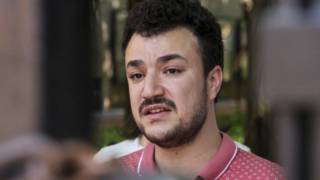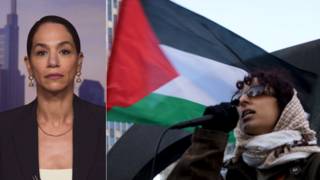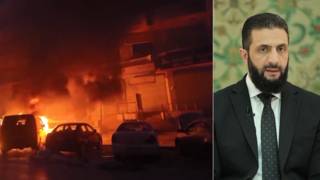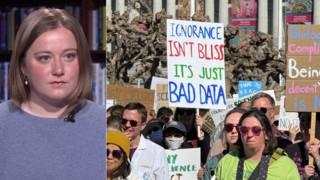HeadlinesSeptember 27, 2016
Clinton and Trump Face Off at First Presidential Debate
Donald Trump and Hillary Clinton faced off Monday night in one of the most anticipated debates in U.S. history. The debate was held at Hofstra University on Long Island and moderated by NBC Nightly News anchor Lester Holt. Ahead of the event, TV network executives predicted as many as 100 million people across the United States would tune in. Many more also watched from around the world, including across Asia, Europe and in Latin America. Third-party candidates, including Libertarian Gary Johnson and the Green Party’s Jill Stein, were excluded from the debate stage under stringent rules set by the Commission on Presidential Debates, which is controlled by the Democratic and Republican parties. Throughout the 90-minute, often antagonistic, debate, Clinton and Trump sparred on everything from foreign policy to trade deals to personal stamina. These are the candidates clashing over the Trans-Pacific Partnership deal, known as the TPP.
Donald Trump: “You called it the gold standard of trade deals.”
Hillary Clinton: “And you know what?”
Donald Trump: “You said it’s the finest deal you’ve ever seen.”
Hillary Clinton: “No.”
Donald Trump: “And then you heard what I said about it, and all of a sudden you were against it.”
Hillary Clinton: “Well, Donald, I know you live in your own reality—”
Donald Trump: “Oh, yeah.”
Hillary Clinton: “—but that is not the facts. The facts are, I did say I hoped it would be a good deal, but when it was negotiated—”
Donald Trump: “Not.”
Hillary Clinton: “—which I was not responsible for, I concluded it wasn’t. I wrote about that in my book.”
Donald Trump: “So is it President Obama’s fault?”
The candidates also clashed repeatedly on foreign policy, including their record on the U.S. invasion of Iraq. This is Hillary Clinton.
Hillary Clinton: “Donald supported the invasion of Iraq.”
Donald Trump: “Wrong.”
Hillary Clinton: “That is absolutely—”
Donald Trump: “Wrong.”
Hillary Clinton: “—proved over and over again.”
Donald Trump: “Wrong.”
Hillary Clinton: “He actually advocated for the actions we took in Libya and urged that Gaddafi be taken out—after, actually, doing some business with him one time.”
24 Arrested Protesting Outside First Presidential Debate
Meanwhile, hundreds of people protested outside the debate at Hofstra University to demand the presidential debates be opened up to third-party candidates. At least 24 people were arrested. Green Party presidential nominee Dr. Jill Stein was escorted off campus by Hofstra security and Nassau County police, despite the fact that she was invited on site by MSNBC, ABC, Fox and CBS for interviews. We’ll be joined by Dr. Jill Stein after headlines today for our two-hour “Expanding the Debate” Democracy Now! special broadcast. Click here to see our full report on the protests at Hofstra University Monday night.
Syrian Gov’t & Russia Continue Bombing Campaign in Aleppo
In Syria, the Assad government and Russia are continuing a devastating bombing campaign against the city of Aleppo for the fourth straight day. As many as 100 people have died since Friday. Witnesses describe it as the worst assault in the five-year civil war. United Nations Secretary-General Ban Ki-moon has expressed outrage at reports the Russians have begun using so-called bunker-busting bombs, which can destroy underground shelters and are so powerful they leave deep craters in their wake. This is U.S. Ambassador to the United Nations Samantha Power speaking Sunday.
Samantha Power: “Russia and Assad have reportedly launched more than 150 airstrikes over the last 72 hours, killing at least 139 people and injuring hundreds more, laying waste to what is left of an iconic Middle Eastern city. These are people who have suffered horribly in the five-and-a-half years of war, yet they call the attacks from the air unprecedented in quantity and quality.”
Mexico: 30,000 March to Mark 2nd Anniversary of Ayotzinapa Kidnapping
In Mexico City, as many as 30,000 people marched Monday to mark the second anniversary of the kidnapping of 43 students from the Ayotzinapa teachers’ college in the southern Mexican state of Guerrero. The students were attacked by local police and subsequently went missing. An investigation by a team of international human rights experts has discredited the Mexican government’s account that the students were killed by a local drug gang. The experts instead found evidence state, federal and military personnel were present on the night of the disappearance. The experts have also accused the Mexican government of stonewalling and retaliating against investigators. Last week, a United Nations representative visited the Ayotzinapa school and warned of a “climate of impunity.” This is María de Jesús Tlatempa Bello, the mother of one of the disappeared students, speaking during Monday’s march.
María de Jesús Tlatempa Bello: “We had to radically open our eyes and realize in what world we are living, a world of impunity. In this world of impunity that we live in, they want our sons to be forgotten. But they are not going to succeed, because we are going to keep on with our dignified struggle. We, as mothers and fathers, are going to demand—not ask, but demand—that they present our sons alive, because that is how they took them. The police took them away alive.”
NYC Protest Marks 2nd Anniversary of Kidnapping of 43 Mexican Students
Hundreds more people marked the second anniversary of the 43 students’ disappearance in Australia, Los Angeles and in New York City, where Antonio Tizapa, the father of one of the disappeared students, thanked the demonstrators.
Antonio Tizapa: “We feel this energy that comes from those hearts who, without knowing those students, went out to the streets, to the Mexican consulates, to protest and to demand that they give back those kids alive. We, as parents, are very happy on that aspect.”
Colombia: Gov’t & FARC Signs Peace Deal Ahead of Referendum
In Colombia, the government and FARC rebels have signed the historic peace deal during a ceremony in the coastal city of Cartagena Monday. The signing is the latest step in the efforts to end one of the world’s longest conflicts. It began in 1964 and has claimed some 220,000 lives. More than 5 million people are estimated to have been displaced. On Sunday, Colombians will vote in a nationwide referendum over whether to ratify the peace deal.
Texas: Gunman Opens Fire, Injuring 9, at Houston Shopping Center
In Texas, at least nine people were wounded after a gunman opened fire at a shopping center in Houston on Monday morning, before being killed by police. Police have named the suspected gunman as Nathan DeSai. Police say he was carrying Nazi emblems and had Civil War paraphernalia in his car. Police say they recovered a .45 semi-automatic “Tommy Gun” as well as 2,600 rounds of live ammunition at the scene. One of his victims is in critical condition.
FBI: Murders in U.S. Jump 10.8% in 2015
This comes as new data released by the FBI on Monday shows murders in the United States jumped more than 10 percent last year. It’s the biggest increase in the homicide rate since 1971. The data shows the increase most affected African-American men: At least 900 more were killed in 2015 than during the previous year.
Alabama: Prison Guards Launched Work Strike Saturday at Holman
In Alabama, prison officials have confirmed a group of correction officers refused to report for the evening shift Saturday at the Holman Correctional Facility in Atmore. The apparent work strike comes as guards have been walking off the job amid safety concerns and overcrowding throughout the summer. This is incarcerated organizer Kinetik Justice, speaking from inside the Holman prison on Saturday. Listen closely.
Kinetik Justice: “It’s official. At 6:00, no officers came to work. None came to work. None of the officers came to work. Deputy Commissioner Culliver passed me my tray. Every cell, he’s passing out the tray. No officers came to work. They completely bucked on the administration. No more will they be pawns in the game. Nighttime it’s going down.”
Report: 46 Prisons See Protests, Lockdowns Amid Historic Work Strike
This comes as the largest prison work strike in U.S. history continues. Mask Magazine, which has been tracking the strike, reports at least 46 prisons and jails across the United States have seen some form of protest or lockdown since the strike began on September 9. The Incarcerated Workers Organizing Committee says at one point about 20,000 prisoners were on strike.
ND: Cannonball Ranch Sold to Dakota Access Pipeline Company
In news from the ongoing struggle at Standing Rock in North Dakota, the Dakota Access pipeline company has bought thousands of acres of land from private landowners just north of the site where thousands of Native Americans representing hundreds of tribes are camped out to resist the pipeline’s construction. The purchase of the land known as Cannonball Ranch includes the sacred tribal burial site that was destroyed by the Dakota Access pipeline company on September 3, when the company’s security guards attacked Native Americans with dogs and pepper spray.
Robert Redford Backs Resistance to Dakota Access Pipeline
This comes as Hollywood star Robert Redford has spoken out in support of the fight against the Dakota Access pipeline, saying, “If this is legal, one must seriously question the laws of the land. They are laws that prioritize the profits of energy companies over the rights of people who actually have to live on the land, drink its water and eat its food.” President Obama also commented on the ongoing struggle on Monday, as he hosted a conference for Native American tribes at the White House.
President Barack Obama: “I know that many of you have come together across tribes and across the country to support the community at Standing Rock, and together you’re making your voices heard.”
U.N. Rep.: U.S. Police Killings “Reminiscent” of Lynching
And the head of the U.N. Working Group of Experts on People of African Descent has compared police killings of African Americans in the United States to lynchings. The comments come as protests continue in Charlotte, North Carolina, over the police killing of Keith Lamont Scott, and in Tulsa, Oklahoma, over the police killing of Terence Crutcher. This is U.N. representative Ricardo Sunga speaking today in Geneva.
Ricardo Sunga III: “Contemporary police killings, and the trauma that they create, are reminiscent of the past racial terror of lynching. Impunity for state violence has resulted in the current human rights crisis and must be addressed as a matter of urgency. The working group is convinced that the root of the problem lies in the serious lack of accountability for perpetrators of such killings despite the evidence.”
Most popular
- 1
- 2
- 3
- 4
Non-commercial news needs your support
Please do your part today.











Media Options